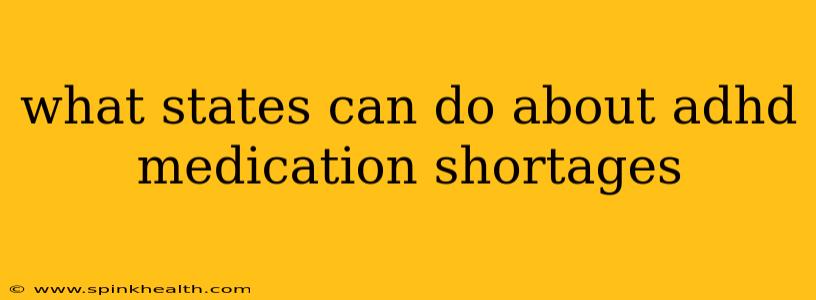What States Can Do About ADHD Medication Shortages: A Story of Advocacy and Action
The frantic phone calls, the desperate searches online, the agonizing wait—the ADHD medication shortage isn't just a headline; it's a lived reality for countless families across the nation. Parents juggle work, childcare, and the immense emotional toll of watching their children struggle without the support they need. But amidst the chaos, there’s a growing movement demanding action, and it starts at the state level.
This isn't a new problem; periodic shortages have plagued the ADHD medication supply chain for years. However, the recent scarcity has reached unprecedented levels, leaving many feeling abandoned and unheard. So, what can states actually do to alleviate this crisis? The answer, like the problem itself, is multifaceted.
How Severe is the ADHD Medication Shortage?
The severity of the shortage varies geographically and by specific medications. Some states are experiencing far more significant disruptions than others. This isn't simply about inconvenience; for many, the lack of access to medication means a return to debilitating symptoms: hyperactivity, impulsivity, inattention—impacting school performance, relationships, and overall well-being. This is a public health crisis demanding immediate attention.
What Steps Can States Take to Address the Shortage?
States have several options to mitigate the effects of ADHD medication shortages:
1. Improving Communication and Coordination:
- Strengthening communication channels: States can establish direct communication lines with pharmaceutical companies, wholesalers, and pharmacies to receive real-time data on medication availability. This proactive approach can help identify impending shortages and allow for early intervention.
- Centralized information hubs: Creating a central repository of information about medication availability, including alternative formulations and pharmacies with stock, can help families navigate the complex landscape of the shortage. This is crucial for timely access to necessary care.
2. Enhancing Regulatory Frameworks:
- Streamlining the prescription process: States could explore ways to simplify the prescription process for commonly used ADHD medications, potentially reducing administrative burdens on healthcare providers and pharmacies.
- Facilitating access to generic medications: Promoting the availability and use of generic alternatives can lessen reliance on specific brand-name medications, which are often more susceptible to shortages.
3. Supporting Patients and Healthcare Providers:
- Financial assistance programs: States can expand existing programs or create new initiatives to offer financial assistance to families struggling to afford ADHD medications, particularly during times of shortage.
- Increased provider training and education: Educating healthcare providers on managing patients during shortages, including strategies for medication management and alternative therapies, is vital for comprehensive patient care.
4. Investing in Research and Development:
- Funding research into new ADHD medications: Although this is a longer-term solution, supporting research into novel ADHD treatments can potentially reduce our reliance on a limited number of drugs in the future. This proactive approach can prevent future shortages.
Can States Control Drug Pricing?
While states have limited direct control over the pricing of pharmaceuticals, they can advocate for federal policies that promote fairer pricing practices. This could involve supporting legislation aimed at increasing transparency in drug pricing and limiting the influence of large pharmaceutical companies on medication costs.
What Role Do Pharmacies Play?
Pharmacies are on the front lines of the shortage. Their role is crucial in informing patients about medication availability and coordinating care. States can support pharmacies by providing resources and training to help them better manage the challenges posed by medication shortages.
What Are Other Potential Solutions?
Looking beyond immediate solutions, there's an urgent need for a more resilient drug supply chain. This might include diversifying the manufacturing base for ADHD medications, increasing domestic production, and exploring new distribution models to ensure greater stability and access.
The ADHD medication shortage is a complex problem with no easy fix. However, by taking a multi-pronged approach that combines communication, regulatory reform, patient support, and investment in research, states can significantly improve the situation and alleviate the suffering of countless individuals and families. This isn't simply about medication; it's about ensuring access to the care necessary for millions to thrive.

